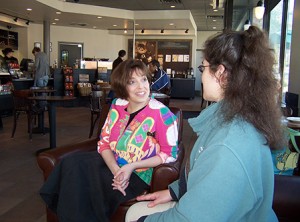The “Typical” World that We Live in
Does Not Have to Be a Confusing
or Frustrating Place
The unwritten rules of social interaction can be learned. Teens and adults with learning differences may not have picked up these unwritten social rules when they were young, but it is never too late to learn and master them.
 I do one on one coaching with teenagers and adults with Autism, Aspergers, ADHD, Social Anxiety and other Special Needs. In my coaching, I use virtual technology in my office to create a real time environment, which is critical to an individual with Asperger’s learning style.
I do one on one coaching with teenagers and adults with Autism, Aspergers, ADHD, Social Anxiety and other Special Needs. In my coaching, I use virtual technology in my office to create a real time environment, which is critical to an individual with Asperger’s learning style.
If possible, if the client is able and comfortable and I receive permission, we will go into a real venue. I’ve gone to many social events, either being directly with the client or being available from a distance. This method also provides them with my immediate feedback, both positive and what needs to be worked on. Both of these methods are based on the necessity of learning how to use the technique in their chosen environment.
After working with me, my clients’ confidence goes up. They are able to go into a social situation instead of avoiding it, have a conversation, and then come out of it feeling like, “I did that.” I have helped a lot of teens and adults on the autism spectrum with conversations, body language, and meeting social expectations.
What is really nice is when my clients find themselves able to do things that in the past they weren’t able to. Before, it used to be this big pie in the sky, like, “I don’t do well socially.” Now it’s, “I don’t do well with small talk,” or “I don’t do well with body language,” but it’s not the whole thing. Now it’s, “I still have a hard time with this, but I can do that, and I can do that, and I can do that really well.”
It’s so rewarding when I hear them say that. A lot of times, my clients’ parents will say to me, “Wow, when we go to these family get-togethers now, aunt Alice and uncle Jake tell us, ‘I can talk to him now.’” It makes them feel good. It makes them feel like successful parents.